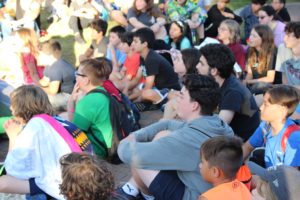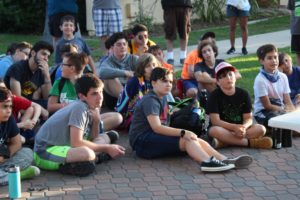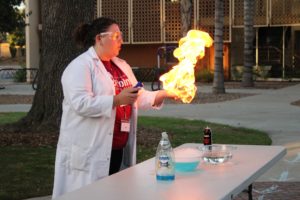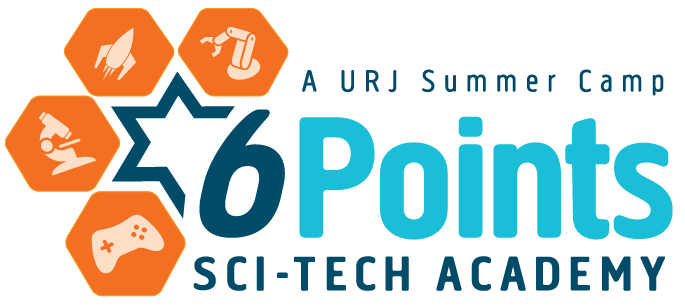Every evening at URJ SciTech West, ahead of an always-epic Erev Big Bang, the campers are asked these questions, “What do you know about science that you did not know when you woke up this morning?” and “What did you fail at today?” The responses are honest, poignant, often funny, and very humbling.
After listening to these amazing young learners day after day share their failings, I realized something – failure isn’t doing something wrong… Rather it is doing something right! If the great Jewish scientist Albert Einstein was a SciTech West camper, he might answers these questions saying, “A person who never made a mistake never tried anything new.” Amen!

We so often talk about failures or making mistakes as some sort of set-back, error, or lack of success. And frankly, we couldn’t be more wrong. My father, the one who first welcomed me into his lab and inspired me to study science, always taught me that “science is the study of failure.” Things go wrong; they always do: a reagent fails, a piece of equipment breaks, calculations are off, and on and on. Good science means making mistakes and embracing failure.
American author James Joyce said, “mistakes are the portals of discovery.” In reality, we actually learn very little when something goes right. It is when things going wrong that we do our best learning and our best growing, as scientists and as people. This is when we are most engaged in problem solving, critical thinking, innovation, creativity, and more. When things go right, we accept them as they are. When things go wrong, we expand and grow our mindset, our determination level, the reach of what is possible. This is the moment of discovery.

At SciTech, I ran a JLab learning program about Judaism, science, and making mistakes. In a Jeopardy game, we look at ancient Jewish wisdom and views about science, medicine, astronomy, and more. At first, the students thought that our Sages would be quite ignorant and uninformed about the world. As they learned, there was a range – some wrong, no doubt, but quite a bit, spot on. The students were sheepishly amazed, both at our Sages’ knowledge as well the students’ own preconceptions. This was balanced with looking at scientific theories throughout the ages – many accepted as fact for centuries but eventually proven wrong, and other laughable ideas later found to be correct.
Both of these ideas, woven together, paint a clear concept – we only learn best when we are wrong, and we grow the most when our ideas change along the way. In this regard, by never being held back and always striving to keep moving forwards, in science and in life, we are also truly living out one of the Core Values of SciTech West: Patience & Perseverance (Savlanut v’ Hatmadah). 19th Hassidic scholar Rabbi Mordechai Yosef of Ishbitz explains that “a person can only uphold the teachings of the Torah when they have stumbled in them,” meaning a person makes mistakes and then learns from them. Only then is Torah, Jewish wisdom, attained.
When asked about failure and mistakes, our SciTech campers said, “When something goes wrong, I learn how to be better.” And, “I didn’t fail. I just learned what not to do next time.” And, “Mistakes are necessary to make big discoveries.” Inspiration from our next generation of leaders, thinkers, and pioneers. They did not make mistakes; they learned. They did not fail; they grew. They taught me, and us, the right way to approach the world.
So let us ask ourselves, what did we learn today, and what did not go right? Perhaps most importantly of all, where we did grow?
As a postnote: My second year as Faculty at URJ 6 Points SciTech West has come to an end and I am as grateful as ever. I can definitely say that attending, supporting, and helping to grow SciTech West was not a mistake. Instead, there is the dedicated, hard work, and boundless energy of the Leadership Team and Counselors. They are blessings to each and ever camper, and family, who are lucky to be part of this remarkable community. I hope we all learn and grow for many more years to come.
Rabbi Jason Levine is the Associate Rabbi at Temple Beth Am in Seattle, Washington.

